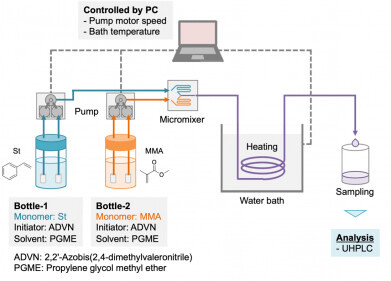-
.jpg) L to R: Stefano Agrestini, beamline scientist on I12, Kejin Zhou, principal beamline scientist on I21, Robert House, 30 under 30 finalist and I21 user, Mirian Garcia Fernandez, beamline scientist on I21, Thomas Rice, senior mechanical beamline technician on I21 (Credit: Diamond Light Source)
L to R: Stefano Agrestini, beamline scientist on I12, Kejin Zhou, principal beamline scientist on I21, Robert House, 30 under 30 finalist and I21 user, Mirian Garcia Fernandez, beamline scientist on I21, Thomas Rice, senior mechanical beamline technician on I21 (Credit: Diamond Light Source)
Research News
Oxford Fellow recognised for sustainable Na-ion battery materials research
Dec 03 2023
Robert House, a Senior Research Fellow at Oxford University, has been selected as one of Forbes Magazine’s '30 people to watch under 30' for his leadership into the development of innovative, sustainable sodium ion (NA-ion) battery materials, as a cheaper and easier to source alternative to lithium (Li-on) or cobalt.
Having secured £500k in fellowship funding from the Royal Academy of Engineering and £50k from the University of Oxford in 2021, his research group have been working on the I21 RIXS beamline at Diamond Light Source to help them identify energy storage mechanisms which could deliver improvements in Na-ion cathode materials, which lag behind the performance of Li-on.
“I'm thrilled to be listed among some of Europe's top young scientists and innovators under 30. To tackle the climate crisis, we must move away from burning petrol and diesel in our vehicles as a matter of urgency,” said Robert. “Electric vehicles (EVs) are the next best alternative, but they currently rely on Li-ion battery technology which is expensive and can make up to half of the cost of buying the car. To make more affordable EVs and to reduce our dependence on critical elements, we have to look beyond Li-ion to other rechargeable batteries. The future of batteries is coming: Na-ion and beyond.”
The I21 RIXS beamline is a dedicated Resonant Inelastic soft X-ray Scattering (RIXS) beamline that provides a highly monochromatised, focused and tunable X-ray beam onto materials: “Over the last few years, together with the beamline team at I21, Prof Sir Peter Bruce and his team and Faraday Institution researchers on the CATMAT project, we have used RIXS to develop a detailed understanding of the mechanism by which oxygen is able to store energy reversibly in the cathode. We have been able to identify two unique mechanisms which if used in the right way could deliver improvements in the energy density of cathode materials,” explained Robert.
Robert’s group are focused on discovering new cathode materials for Na-ion cells made from earth-abundant precursors such as salt and rust, which being bound together through novel synthesis approaches should exhibit comparable performance to cathodes such as the lithium iron phosphate (LiFePO4) battery, as they are able to store additional electrons using the oxygen ions in the material.
The judges for the Forbes’ 30 Under 30 Europe Science & Healthcare (2023) list were Sona Chandra, Jonathan Dickinson, Linda Partridge and Sabina Wizander.
More information online
Digital Edition
Lab Asia 31.6 Dec 2024
December 2024
Chromatography Articles - Sustainable chromatography: Embracing software for greener methods Mass Spectrometry & Spectroscopy Articles - Solving industry challenges for phosphorus containi...
View all digital editions
Events
Jan 22 2025 Tokyo, Japan
Jan 22 2025 Birmingham, UK
Jan 25 2025 San Diego, CA, USA
Jan 27 2025 Dubai, UAE
Jan 29 2025 Tokyo, Japan


















